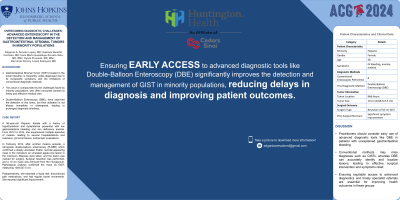Monday Poster Session
Category: Small Intestine
P3298 - Overcoming Diagnostic Challenges: Advanced Enteroscopy in the Detection and Management of Gastrointestinal Stromal Tumors in Minority Populations
Monday, October 28, 2024
10:30 AM - 4:00 PM ET
Location: Exhibit Hall E

Has Audio
- EA
Edgardo A. Arevalo Lopez, MD
Huntington Memorial Hospital
Pasadena, CA
Presenting Author(s)
Edgardo A. Arevalo Lopez, MD1, Gabriela Bedolla Carriedo, MD2, Irene Maria Guadalupe. Arevalo Soto, MD, MSc3, Sylvia Preciado, MD, MSc1, Bernardo Donery Lopez Samayoa, MD4
1Huntington Memorial Hospital, Pasadena, CA; 2Universidad Michoacana de San Nicolas de Hidalgo, Redlands, CA; 3Universidad de El Salvador/Universidad Europea del Atlantico, Los Angeles, CA; 4Johns Hopkins Bloomberg School of Public Health, Baltimore, MD
Introduction: Gastrointestinal Stromal Tumor (GIST) located in the small intestine, is frequently under-diagnosed due to its nonspecific symptoms and the limitations of conventional diagnostic methods. This issue is compounded by the challenges faced by minority populations, who often encounter barriers to timely and effective medical care. Double-Balloon Enteroscopy (DBE), have improved the detection of this tumor, but their utilization is not always immediate or widespread, leading to prolonged diagnostic timelines.
Case Description/Methods: A 58-year-old Hispanic female with a history of hypothyroidism and dyslipidemia presented with low gastrointestinal bleeding and iron deficiency anemia. From 2012 to 2014, she experienced multiple episodes of melena, leading to several hospitalizations and extensive, yet inconclusive, endoscopic evaluations.
In February 2014, after another melena episode, a retrograde double-balloon enteroscopy (R-DBE) which confirmed a deeply ulcerated, friable, necrotic-appearing mass in the mid-ileum an ulcerated apple-core lesion in the mid-ileum. Biopsies were taken, and the lesion was marked for surgery. Surgical resection was performed, and a 10 cm mass was removed from the mid-jejunum. Pathological analysis confirmed the mass as GIST, measuring 10x8.5x7.5 cm.
Postoperatively, she tolerated a liquid diet, discontinued pain medications, and had regular bowel movements. She reported significant improvement.
Discussion: Practitioners should consider early use of advanced diagnostic tools like DBE in patients with unexplained gastrointestinal bleeding. Conventional methods may miss diagnoses such as GISTs, whereas DBE can accurately identify and localize lesions, leading to effective surgical intervention and symptoms relief. Ensuring equitable access to advanced diagnostics and timely specialist referrals are essential for improving health outcomes in these groups.
Disclosures:
Edgardo A. Arevalo Lopez, MD1, Gabriela Bedolla Carriedo, MD2, Irene Maria Guadalupe. Arevalo Soto, MD, MSc3, Sylvia Preciado, MD, MSc1, Bernardo Donery Lopez Samayoa, MD4. P3298 - Overcoming Diagnostic Challenges: Advanced Enteroscopy in the Detection and Management of Gastrointestinal Stromal Tumors in Minority Populations, ACG 2024 Annual Scientific Meeting Abstracts. Philadelphia, PA: American College of Gastroenterology.
1Huntington Memorial Hospital, Pasadena, CA; 2Universidad Michoacana de San Nicolas de Hidalgo, Redlands, CA; 3Universidad de El Salvador/Universidad Europea del Atlantico, Los Angeles, CA; 4Johns Hopkins Bloomberg School of Public Health, Baltimore, MD
Introduction: Gastrointestinal Stromal Tumor (GIST) located in the small intestine, is frequently under-diagnosed due to its nonspecific symptoms and the limitations of conventional diagnostic methods. This issue is compounded by the challenges faced by minority populations, who often encounter barriers to timely and effective medical care. Double-Balloon Enteroscopy (DBE), have improved the detection of this tumor, but their utilization is not always immediate or widespread, leading to prolonged diagnostic timelines.
Case Description/Methods: A 58-year-old Hispanic female with a history of hypothyroidism and dyslipidemia presented with low gastrointestinal bleeding and iron deficiency anemia. From 2012 to 2014, she experienced multiple episodes of melena, leading to several hospitalizations and extensive, yet inconclusive, endoscopic evaluations.
In February 2014, after another melena episode, a retrograde double-balloon enteroscopy (R-DBE) which confirmed a deeply ulcerated, friable, necrotic-appearing mass in the mid-ileum an ulcerated apple-core lesion in the mid-ileum. Biopsies were taken, and the lesion was marked for surgery. Surgical resection was performed, and a 10 cm mass was removed from the mid-jejunum. Pathological analysis confirmed the mass as GIST, measuring 10x8.5x7.5 cm.
Postoperatively, she tolerated a liquid diet, discontinued pain medications, and had regular bowel movements. She reported significant improvement.
Discussion: Practitioners should consider early use of advanced diagnostic tools like DBE in patients with unexplained gastrointestinal bleeding. Conventional methods may miss diagnoses such as GISTs, whereas DBE can accurately identify and localize lesions, leading to effective surgical intervention and symptoms relief. Ensuring equitable access to advanced diagnostics and timely specialist referrals are essential for improving health outcomes in these groups.
Disclosures:
Edgardo Arevalo Lopez indicated no relevant financial relationships.
Gabriela Bedolla Carriedo indicated no relevant financial relationships.
Irene Arevalo Soto indicated no relevant financial relationships.
Sylvia Preciado indicated no relevant financial relationships.
Bernardo Donery Lopez Samayoa indicated no relevant financial relationships.
Edgardo A. Arevalo Lopez, MD1, Gabriela Bedolla Carriedo, MD2, Irene Maria Guadalupe. Arevalo Soto, MD, MSc3, Sylvia Preciado, MD, MSc1, Bernardo Donery Lopez Samayoa, MD4. P3298 - Overcoming Diagnostic Challenges: Advanced Enteroscopy in the Detection and Management of Gastrointestinal Stromal Tumors in Minority Populations, ACG 2024 Annual Scientific Meeting Abstracts. Philadelphia, PA: American College of Gastroenterology.
